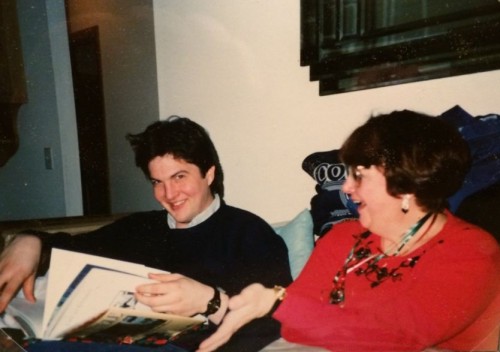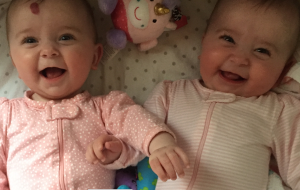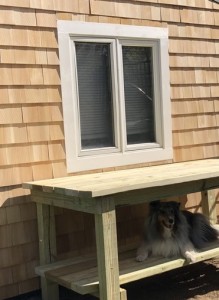These pandemic days can sometimes mess with my head. My thoughts seem to phase in and out of time. My mind goes to old places, distant moments. Life can feel untethered, unanchored. I lose track of the now, whatever that is.
Many people have said of life during lockdown that they often don’t know what day it is. I catch myself unsure of the month, sometimes even the year. Before the world imploded in March, a structured, regular flow of events, however mundane, moved us forward. I might easily predict what I’d be doing in 6 weeks or 6 months. Or where I might travel next year on vacation. Now, what does a year even mean anymore?
In June I went to 20 Overland to get some files from my cube. My desk calendar was still set at March. I did not flip over the months to update it. Like a long-lost remnant of an ancient culture, I wanted to preserve it as it stood. Future archeologists are sure to thank me. What good would it do anyway to reset it? That same hesitation will happen again the next time I go in. A sun dial, an abacus, a witch at the Temple of Delphi, these tools are now just as good as any to measure time.
Contributing to my feeling strange is the recent death of my mother. I had not wanted to write about that. It feels manipulative to eulogize her in this forum, like trolling for condolences. I don’t want that any more than you do. All the same, I want to share a few details about this event. There’s no way to tell my disjointed pandemic story without telling hers. My sincerest hope is that it might resonate with others who have endured hardships or lost loved ones during this time.
My mother did not have COVID-19 but another type of respiratory issue, pulmonary fibrosis. In many ways it is similar in its symptoms, treatment, and outcomes. On May 2nd she was rushed to the hospital with great difficulty breathing. Upon arriving they pumped six liters of fluid from her lungs. They told us her condition was dire, to prepare for the worst. Even though she was not in great health generally speaking, this came as an extreme and sudden shock.
She was admitted into the ICU and placed on a ventilator. She did not die that night, or the next day, or the next. Her condition was severe, they said, but there was hope. Time on a ventilator could give her lungs a chance to heal. Day after day we received updates from the doctors and nurses. There were good signs and bad signs. One day blood pressure numbers suggested progress. The next day oxygen levels said regression. Today could be the day. Or tomorrow. We tried to stay hopeful, but we always knew what was looming. On and on it went like that, every day, for three straight weeks.
All the while, the pandemic raged on. The ICU where she was treated was filled with COVID patients. Lockdown protocols meant we were not able to visit her. The nurses and PAs were extremely sympathetic to this circumstance. They went out of their way to spend time at my mother’s bedside, chat with her, and hold her hand. They even arranged a virtual Facetime visit for us to talk to her. But from the first moment that she went on the ventilator, there were never any clear signs if she was conscious or not.
The doctor’s reports were always realistic but also slanted toward the positive. Sensing this, I did my own research. After two weeks on a ventilator you really should be well enough to come off it, to breathe on your own without it. My mother did improve slightly the first week on the vent. After that she plateaued, no better and no worse, at least by measure of the data points. However, the thing a former ER nurse told me about ventilators is that there really is no such thing as plateauing. If you’re not getting better after two weeks, you’re getting worse. Failure to thrive sets in. That final third week was a tense time. I had prepared myself for the likely final outcome. My siblings clung to fading hopes that varied in degrees of desperation. There was in-fighting, uncertainty, and despair.
Memorial Day marked the end of the third week. The doctors told us we had reached the end. The time had come to take my mother off the ventilator. Comfort care would be administered. Then and only then we were permitted in the hospital for a farewell visit. The hospital staff, working on a day most people had off, could not have been more gracious and caring while guiding us through those last moments. The many stories about the heroic efforts of healthcare workers during the pandemic are not just feel-good exaggerations. With first-hand experience I can testify that they are entirely true. They are the best of us.
Masked up and symptom screened, I was escorted into my mother’s room in the ICU. I’m the oldest so I went first. I will spare you the grim details of how ventilators and the human body intersect. The visit was difficult. There was no saying goodbye; in essence she was already gone, only the machine lived. After we each had our turn and left the hospital, she was taken off the vent. Two hours later my mother passed.
******
I came upon this quote once and it has been haunting me during the pandemic:
“So we beat on, boats against the current, borne back ceaselessly into the past.”
– F. Scott Fitzgerald, “The Great Gatsby”
Bowing down to the pandemic, my day-to-day existence is a benevolent house-arrest. When I’m not caught up in work, the world feels very still. My only company is a geriatric pug-dog. I talk to him all day long like Tom Hanks talking to that volleyball on the deserted island. Due to his health, I’ve abandoned my home office on the 3rd floor and set up shop at the dining room table. There is no separation between home and office, in space or in time. Stumbling through the days, I drift in and out of the present moment.
May 2nd, the day my mother went into the hospital, was supposed to be the 146th running of the Kentucky Derby. Someone asked me at the funeral if she and I were close. Without thinking I said, “at times”. One of the things we shared, unique to us, was our love of the Triple Crown. We would compare notes about horses we liked and bellyache after about which stupid horse ruined whose trifecta. This year the Kentucky Derby was postponed due to the pandemic.
More impressions float through my mind each day. My mother waking up my brother and me to watch the astronauts walk on the moon. Or when she took all us kids to Tanglewood to see the Boston Pops. They were doing Stravinsky’s “Rite of Spring”. During the final crescendo a rainstorm suddenly pummeled down on us complete, with lightning and thunder. It was cinematic. My pre-teen brain melted.
And plenty of other memories are popping up, things I haven’t thought of in years. Old girlfriends, old careers, the joys and failures of each. Other family and friends who are gone.
My father wasn’t around much when I was a kid, but one summer he was. He took me with him on his part time job delivering phone books around my hometown. He let me hold the steering wheel while driving around at 5 miles per hour. When he was bored, he let me throw phonebooks into the yards of suburban Connecticut. The results were violently haphazard.
I think about a good friend from college who passed away too young. He had taught me the backup vocals on “Midnight Train to Georgia”. He could do the Pips choreography too, but back then I was too clumsy to master it. I try it now when I’m bored. It’s easier with only a pug around to judge me.
******
In times of crisis, we endure and persevere to make it through. We show determination, compassion, and resilience. Churchill said we must never give in, never, never, never. Belichick says, “just do your job” and we do. The dying words of the Buddha were “you must strive on vigorously.” These are the noble ideas that the present crisis demands of us.
Wistfully we speak of a vaccine resetting the clock. No doubt it will come soon, this year, next year. The magic wand of medical science will correct all. We’ll be back on solid ground then, back to normal. All snark aside, I hope that happens. But until it does, what do we really have, in this moment, now?
In physics, the Principle of Moments describes how the force and distance of objects can create balance or imbalance depending on the measure of each. I believe F. Scott Fitzgerald understood that this was true of people too. Each human moment carries a force and a distance. When unbalanced, moments leave us adrift like poor Gatsby. Currents take us where they will despite our efforts and best intentions to move forward.
Given a difficult present and an utterly uncertain future, is it any wonder that people might drift back into the past?

My mother and me, Christmas 1992 (I think)












